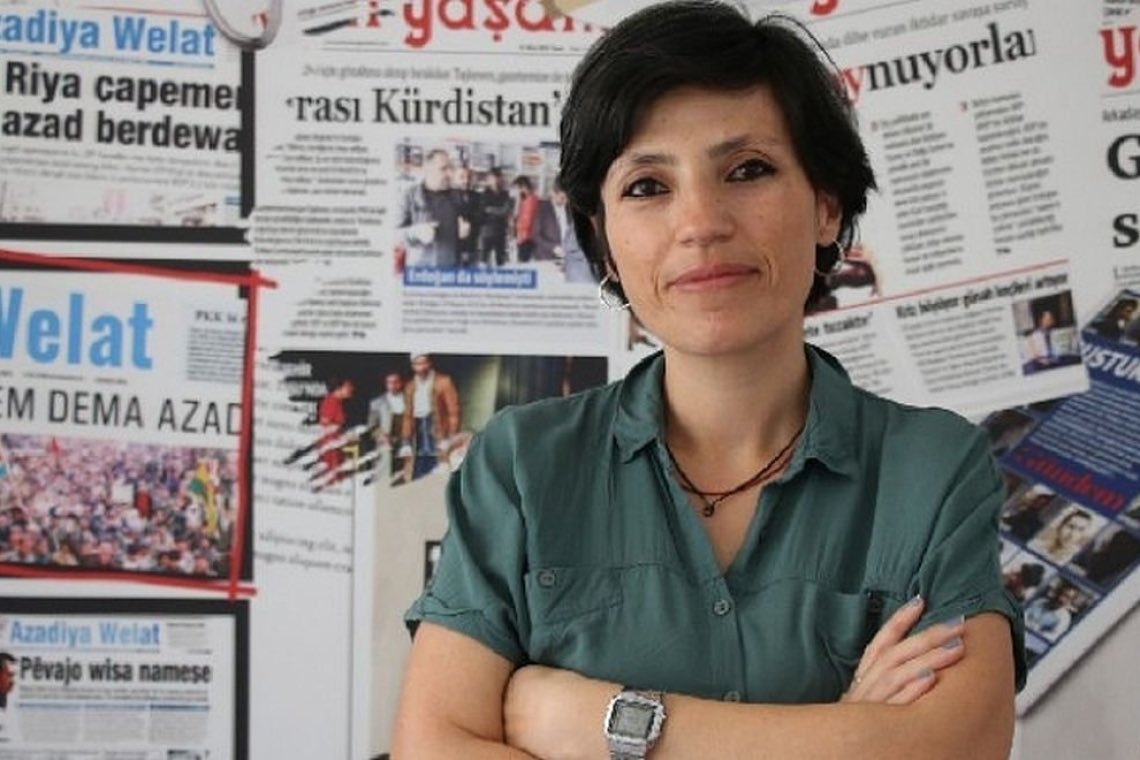By DENİZ TEKİN
Journalist Dicle Müftüoğlu, Co-Chair of the Dicle Fırat Journalists Association (DFG), has been detained for over 300 days, with the third hearing of her trial scheduled for 29 February. National and international institutions have made consecutive statements calling for Müftüoğlu's release. Veysel Ok, Co-Director of the Media and Law Studies Association (MLSA), commented that if Müftüoğlu's journalism activities are used as a basis for punishment, no one in Turkey will be able to practice journalism. Lawyer Resul Temur remarked, "It's impossible to evaluate the attitude towards Dicle within a legal framework."
Müftüoğlu, also an editor at Mezopotamya Agency, has been held at the Sincan Women's Closed Prison for 305 days. The charges against her include "membership in a terrorist organization" and "leading a terrorist organization," with evidence consisting of her domestic and international travels, hotel stays, witness statements, phone records with journalist colleagues, and bank transactions, all within the scope of her journalistic activities. In the two previous hearings, Müftüoğlu defended herself stating, "What's on trial here is my journalism," and denied all charges.
Prior to the third hearing of the case at the Diyarbakır 5th High Criminal Court on February 29, Temur and Ok provided insights regarding Müftüoğlu's case file, accusations, and prolonged detention.
‘It's impossible to evaluate Dicle's case within a legal context’
Temur stated that the investigation against Müftüoğlu is politically motivated, not legal. "In such a case, the investigation or prosecution should be conducted in the provinces where the person resides. The file was handled in Ankara for political reasons," he said.
Temur pointed out that all individuals detained in the same case based on the same witness statements and evidence, including journalist Sedat Yılmaz, were released, except for Müftüoğlu. He suggested several reasons for her continued detention, including the political nature of her case, her journalistic activity, and the negative stance of the court panel handling political cases. Temur continued, "Dicle is one of many journalists arrested in the last two years. Despite all journalists being released, it's impossible to evaluate the attitude towards Dicle within a legal framework."
‘This case is a duplicate’
Temur highlighted that Müftüoğlu was previously tried in the same court for the same allegations, making this case a duplicate. "One of the fundamental principles of criminal proceedings is that a person cannot be tried twice for the same charges. A trial for two separate allegations of organizational membership relating to the same period is not legally possible. The second trial should be legally dismissed. As the responsible editor of Dicle News Agency, Dicle was charged in 2017 with membership in an organization. One of the witnesses in the current file had given statements in the previous trial regarding the same time and acts. Therefore, the case, in which Dicle has been detained for almost a year, should be dismissed," he added.
‘There is no answer why Dicle's photo was shown to the witness’
After meeting with his client Müftüoğlu in prison before the hearing, Temur stated she is aware of the legal violations in her case. "Dicle has been reporting on political issues for many years. Therefore, she understands that no Kurdish journalist has legal security. This makes her one of the best examples. Dicle is being tried for claims by an open witness who allegedly saw her abroad in 2014, despite her not having traveled abroad. Despite initial statements not mentioning Dicle, why her photo was later shown to the witness remains unanswered in the file. However, we know that the witness was directed by law enforcement and that the file was unlawfully constructed. Dicle's file is a case of such unlawful construction," Temur said.
Ok: A different penal procedure applied throughout Dicle's trial
MLSA Co-Director Veysel Ok commented, "Dicle's case has reached a point beyond herself. The activities subject to accusation in Dicle's file are the same as routine journalistic activities. If these routine journalistic activities, like travels, interactions with news sources, editorial work, are seen as 'terrorist activities,' then no one in Turkey can practice journalism. Every journalist would face being labeled a 'terrorist' for these routine professional activities."
Ok noted that different penal procedure rules have been applied throughout Müftüoğlu's trial. "Dicle was subjected to torture while in custody. She is detained in a prison hundreds of kilometers away from the court where she is tried. Decisions to continue her detention have been made without taking the defense of her lawyers into account and without due process. This is a different procedure. All journalism and professional organizations should follow this trial and witness these events," he added.



